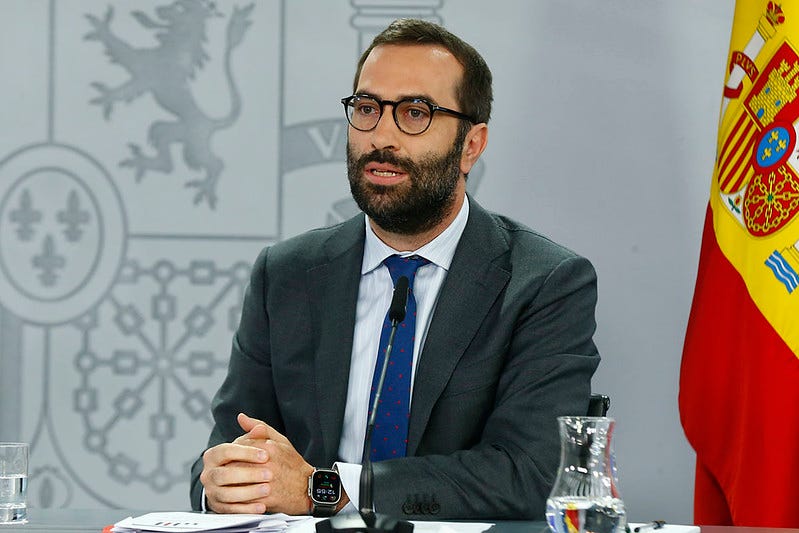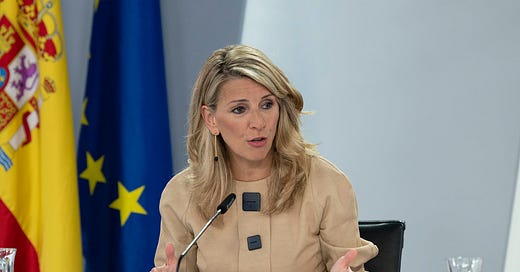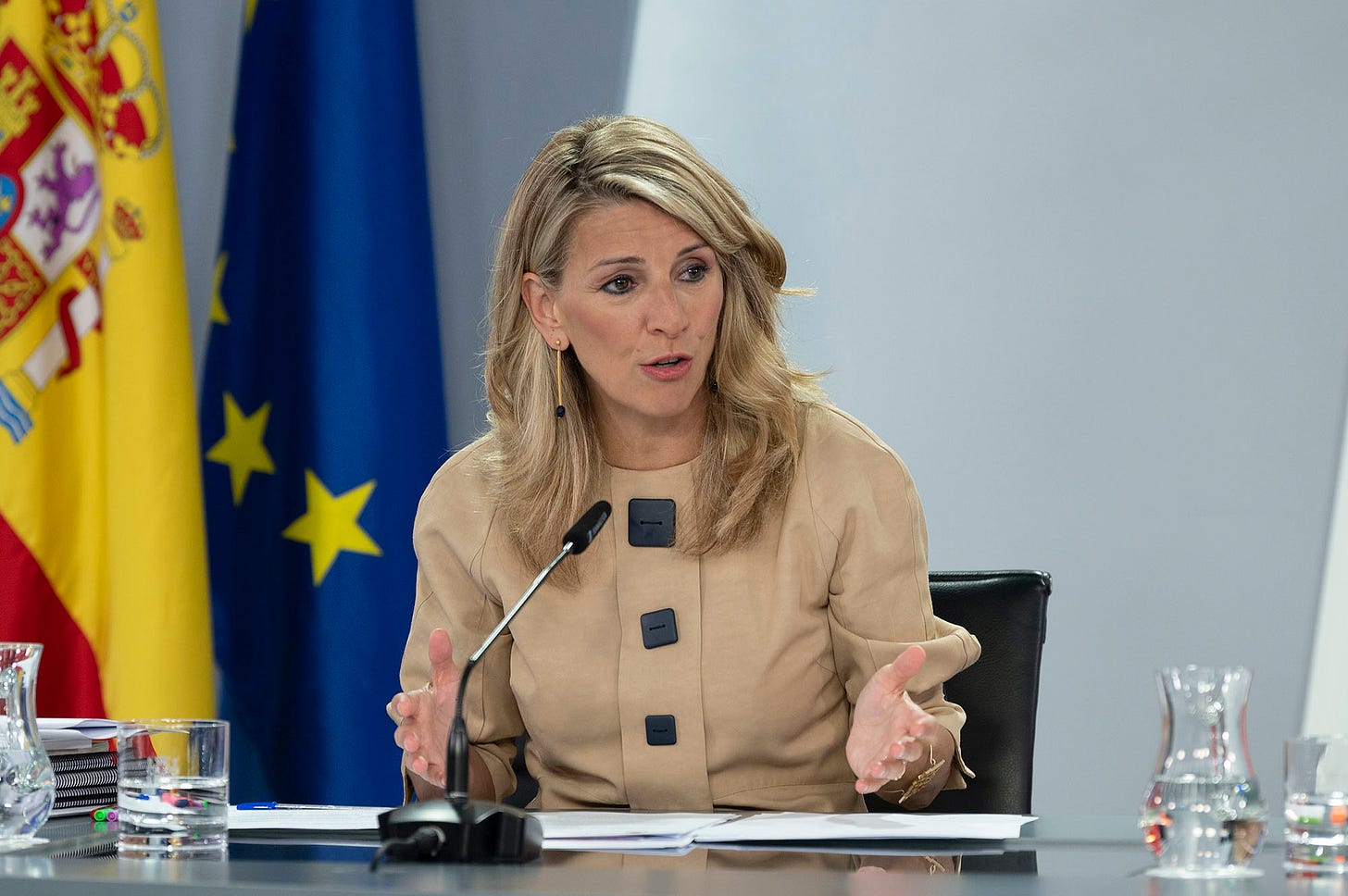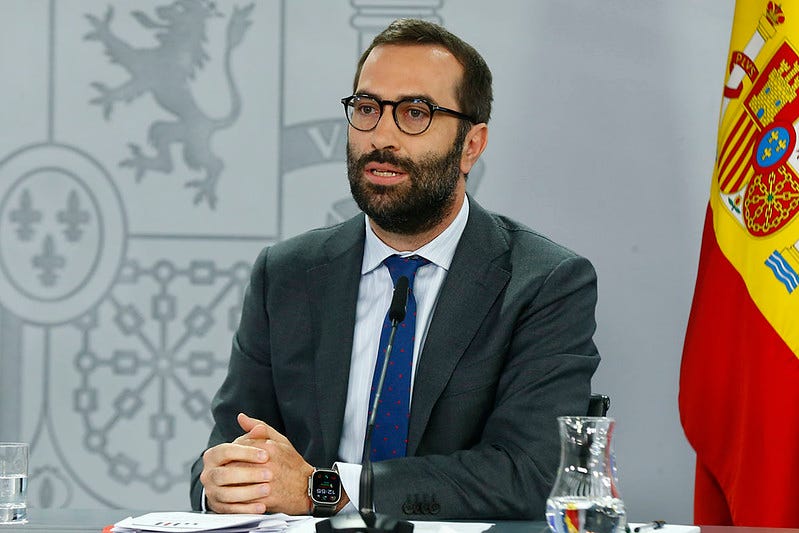El Gobierno propone un aumento de 50 euros mensuales al SMI, mientras sindicatos y empresarios presentan sus demandas y preocupaciones
El Ministerio de Trabajo propone elevar el SMI a 1.184 euros mensuales por catorce pagas y las negociaciones para Incrementar el Salario Mínimo en 2025 Inician con Expectativas y Tensiones
El Ministerio de Trabajo ha dado inicio este miércoles a las negociaciones para aumentar el Salario Mínimo Interprofesional (SMI) a 1.184 euros mensuales por catorce pagas en 2025, lo que representa un incremento de 50 euros al mes y un 4,4% respecto a 2024. La propuesta, liderada por la ministra Yolanda Díaz, ha generado un intenso debate entre sindicatos y el sector empresarial, quienes ya han establecido sus posiciones antes de la reunión inicial. Este aumento busca mejorar el poder adquisitivo de los trabajadores en un contexto de aumento de precios y dificultades económicas, pero enfrenta resistencias significativas por parte de los empresarios.
Desarrollo de la Negociación
La primera mesa de diálogo social para la subida del SMI se llevó a cabo este miércoles con la participación de representantes de sindicatos como CCOO y UGT, y del sector empresarial representado por CEOE y Cepyme. La jornada se dividió en dos partes:
Mañana: La ministra Yolanda Díaz presentó el informe de expertos que respalda la propuesta de incremento del SMI a 1.184 euros, destacando la necesidad de alcanzar al menos el 60% del salario medio conforme a la Carta Social Europea.
Tarde: El secretario de Estado de Trabajo, Joaquín Pérez Rey, dirigió el encuentro con los agentes sociales para iniciar las negociaciones, enfatizando la importancia de equilibrar el poder adquisitivo de los trabajadores con la sostenibilidad económica de las empresas.
La mesa de diálogo social se reunirá nuevamente el próximo 22 de enero para continuar las discusiones y tratar de alcanzar un acuerdo que satisfaga a ambas partes.
Posturas de los Sindicatos y Empresarios
Exigencias Sindicales
Los sindicatos, representados por figuras como Pepe Álvarez (UGT) y Unai Sordo (CCOO), han solicitado un SMI cercano a los 1.200 euros mensuales, lo que implicaría un aumento de entre el 5% y el 6%. Maricruz Vicente (CCOO) y Fernando Luján (UGT) argumentan que este incremento es necesario para cumplir con la meta de la Carta Social Europea y garantizar una mayor estabilidad económica para los trabajadores. Además, los sindicatos han exigido que el aumento del SMI se mantenga exento del Impuesto sobre la Renta de las Personas Físicas (IRPF), una condición que ha sido debatida internamente entre las organizaciones sindicales.
Resistencia del Sector Empresarial
Por su parte, el sector empresarial, representado por CEOE y Cepyme, ha manifestado su preocupación por el aumento real en los costes salariales. Lorenzo Amor, vicepresidente de CEOE y presidente de ATA, ha calificado de “inasumible” el aumento de 50 euros mensuales para los autónomos, argumentando que esta medida podría poner en peligro a muchas pequeñas y medianas empresas. Cepyme ha calculado que este incremento podría suponer un coste adicional de entre 80 y 81 euros mensuales por empleado, afectando especialmente a las pymes que ya enfrentan cargas laborales incrementadas en un 18,1% desde 2019.
Repercusiones y Debate Ministerial
La discrepancia entre el Ministerio de Trabajo y el Ministerio de Economía ha intensificado el debate en torno al SMI. Mientras Yolanda Díaz enfatiza la necesidad de responder a las “necesidades reales” de los trabajadores, el ministro de Economía, Carlos Cuerpo, insiste en que el aumento debe ser coherente con el crecimiento económico general.
Posición de la Ministra Díaz: “Los datos macro no tienen nada que ver con la vida real”, subrayando que la realidad de los ciudadanos demanda un ajuste mas sustancial en el SMI.
Posición del Ministro Cuerpo: Aboga por un incremento alineado con el crecimiento económico, evitando cargas excesivas para el sector empresarial.
Esta confrontación refleja los desafíos que enfrenta el Gobierno para equilibrar las demandas sociales y la viabilidad económica en un contexto de constante evolución.

Perspectivas Futuras
Con la próxima reunión programada para el 22 de enero, las expectativas son que las partes logren avanzar hacia un acuerdo que satisfaga las demandas de los trabajadores sin comprometer la salud financiera de las empresas. La ministra Yolanda Díaz ha expresado optimismo, asegurando que “hay margen para el acuerdo” y que se trabajará arduamente para alcanzarlo.
No obstante, fuentes sindicales consideran difícil que la patronal entre en un pacto, debido al clima de tensión existente y a la resistencia previa de la CEOE a negociar incrementos en el salario mínimo. La situación requiere una mediación eficaz por parte del Gobierno para equilibrar las demandas sociales con la viabilidad económica, especialmente en un contexto donde el bienestar de los ciudadanos y la salud del tejido empresarial son prioritarios.
La negociación para incrementar el SMI a 1.184 euros mensuales representa un momento decisivo en el debate sobre las condiciones laborales en España. Con la participación activa de sindicatos y empresarios, y el liderazgo del Ministerio de Trabajo, el país se encuentra en una encrucijada que determinará el equilibrio entre mejorar el poder adquisitivo de los trabajadores y mantener la competitividad del sector empresarial. La resolución de este debate tendrá implicaciones significativas a nivel nacional, impactando directamente en la economía y el bienestar de la sociedad española.
La capacidad del Gobierno para mediar entre las distintas posturas será crucial en los próximos días, ya que la medida podría definir un nuevo rumbo para la política salarial en España. Este episodio subraya la necesidad de una estrategia integral que responda tanto a las exigencias de justicia social como a la sostenibilidad económica a largo plazo.
The Government proposes a 50-euro monthly increase to the minimum wage, while unions and employers present their demands and concerns
The Ministry of Labor proposes raising the minimum wage to 1,184 euros per month for fourteen payments, and negotiations to increase the minimum wage in 2025 begin with expectations and tensions.
The Ministry of Labor initiated negotiations this Wednesday to raise the Minimum Interprofessional Wage (SMI) to €1,184 per month across fourteen payments in 2025, representing an increase of €50 per month and a 4.4% rise compared to 2024. The proposal, led by Minister Yolanda Díaz, has sparked intense debate between unions and the business sector, who have already established their positions prior to the initial meeting. This increase aims to improve workers' purchasing power in a context of rising prices and economic challenges but faces significant resistance from employers.
Development of the Negotiation
The first social dialogue table for the SMI increase took place this Wednesday with representatives from unions such as CCOO and UGT, and the business sector represented by CEOE and Cepyme. The day was divided into two parts:
Morning: Minister Yolanda Díaz presented the expert report supporting the proposed increase of the SMI to €1,184, highlighting the need to reach at least 60% of the average salary as per the European Social Charter.
Afternoon: The Secretary of State for Labor, Joaquín Pérez Rey, led the meeting with social agents to begin negotiations, emphasizing the importance of balancing workers' purchasing power with the economic sustainability of companies.
The social dialogue table will meet again on January 22nd to continue discussions and attempt to reach an agreement that satisfies both parties.
Positions of Unions and Employers
Union Demands
Unions, represented by figures such as Pepe Álvarez (UGT) and Unai Sordo (CCOO), have requested an SMI close to €1,200 per month, which would imply an increase of between 5% and 6%. Maricruz Vicente (CCOO) and Fernando Luján (UGT) argue that this increase is necessary to meet the European Social Charter's target and ensure greater economic stability for workers. Additionally, unions have demanded that the SMI increase remains exempt from Personal Income Tax (IRPF), a condition that has been debated internally within the union organizations.
Business Sector Resistance
On the other hand, the business sector, represented by CEOE and Cepyme, has expressed concerns about the real increase in labor costs. Lorenzo Amor, Vice President of CEOE and President of ATA, has labeled the €50 monthly increase as “unmanageable” for self-employed individuals, arguing that this measure could endanger many small and medium-sized enterprises (SMEs). Cepyme has calculated that this increase could result in an additional cost of between €80 and €81 per month per employee, particularly affecting SMEs that have already faced a 18.1% increase in labor burdens since 2019.
Repercussions and Ministerial Debate
The discrepancy between the Ministry of Labor and the Ministry of Economy has intensified the debate surrounding the SMI. While Yolanda Díaz emphasizes the need to address the “real needs” of workers, Minister of Economy Carlos Cuerpo insists that the increase must be consistent with overall economic growth.
Position of Minister Díaz: “Macroeconomic data have nothing to do with real life,” emphasizing that the citizens' reality demands a more substantial adjustment to the SMI.
Position of Minister Cuerpo: Advocates for an increase aligned with economic growth, avoiding excessive burdens on the business sector.
This confrontation highlights the challenges the government faces in balancing social demands with economic viability in a constantly evolving context.
Future Perspectives
With the next meeting scheduled for January 22nd, expectations are that the parties will make progress toward an agreement that meets workers' demands without compromising the financial health of businesses. Minister Yolanda Díaz has expressed optimism, stating that “there is room for agreement” and that efforts will be made diligently to achieve it.
However, union sources consider it difficult for the employers' side to enter into a pact due to the existing climate of tension and the CEOE's previous resistance to negotiating minimum wage increases. The situation requires effective mediation by the government to balance social demands with economic feasibility, especially in a context where the well-being of citizens and the health of the business sector are priorities.
The negotiation to increase the SMI to €1,184 per month represents a decisive moment in the debate over labor conditions in Spain. With active participation from unions and employers, and the leadership of the Ministry of Labor, the country stands at a crossroads that will determine the balance between improving workers' purchasing power and maintaining the competitiveness of the business sector. The resolution of this debate will have significant implications both nationally, impacting the economy and the well-being of Spanish society.
The government's ability to mediate between the different positions will be crucial in the coming days, as the measure could set a new direction for wage policy in Spain. This episode underscores the need for a comprehensive strategy that addresses both social justice demands and long-term economic sustainability.






